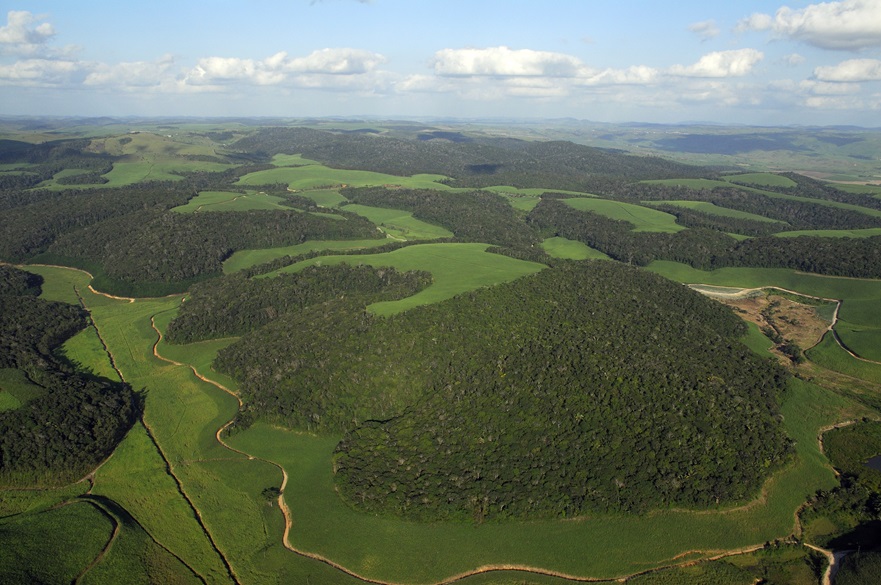Want to preserve biodiversity? Go big, researchers say
Large, undisturbed forests are better for harbouring biodiversity than fragmented landscapes, according to new research.
Published on 12 March 2025
Categories: Press office; Research; School of Animal, Rural and Environmental Sciences;

Ecologists agree that habitat loss and the fragmentation of forests reduces biodiversity in the remaining fragments.
They do not agree, however, on whether it's better to focus on preserving many smaller, fragmented tracts of land, or larger, continuous landscapes.
The study, led by the University of Michigan and involving Nottingham Trent University (NTU) comes to a conclusion on the decades-long debate.
“This puts an end to a long-lasting theoretical debate with strong practical consequences for conservation,” said Dr Felipe Melo, Associate Professor in Ecological Restoration in NTU’s School of Animal, Rural and Environmental Sciences.
"Fragmentation is bad," said study author Nate Sanders, professor of ecology and evolutionary biology at the University of Michigan.
He said: "This paper clearly shows that fragmentation has negative effects on biodiversity across scales. That doesn't mean we shouldn't try to conserve small fragments when we can with our limited conservation dollars, but we need to be wise about conservation decisions."
The study examined 4,006 species of vertebrates, invertebrates and plants sampled at 37 sites around the world to provide a global synthesis comparing biodiversity differences between continuous and fragmented landscapes.
They found that, on average, fragmented landscapes had 13.6% fewer species at the patch scale, and 12.1% fewer species at the landscape scale.
Additionally, the findings suggest that primarily generalist species—species that are good at surviving in various environments—live in the fragmented areas.
The scientists investigated what's called alpha, beta and gamma diversity at these sites. Alpha diversity refers to the number of species in a patch, while beta diversity refers to how species composition differs between two areas. Gamma diversity refers to biodiversity over a whole landscape.
This puts an end to a long-lasting theoretical debate with strong practical consequences for conservation
Dr Felipe Melo, Nottingham Trent University
The study was led by ecologist Thiago Gonçalves-Souza, a research scientist from the Institute for Global Change Biology at the University of Michigan.
He said: "The heart of the debate is that people who argue that fragmentation isn't so bad say that because you have isolated habitats, you have different species composition, which means at a large scale, it's good: if they are different, we can assume that the gamma diversity is going to be higher.
“They say the opposite for large tracts of land: because this is a continuous and homogeneous patch, the species composition is too similar."
But previous research didn't properly compare fragmented landscapes to large, continuous forests, he added.
For example, prior research may have looked at only one component of diversity, or may have compared a few continuous forests to dozens of fragmented patches.
Gonçalves-Souza and colleagues instead constructed an analysis that corrected for differences in sampling across different landscapes.
The group discovered that fragmentation decreased the number of species across all taxonomic groups, but that the increase in beta diversity in fragmented landscapes did not compensate for species diversity loss at the landscape level.
Gonçalves-Souza says that biodiversity isn't the only thing lost when landscapes become fragmented: the ability of the landscape to store carbon is compromised as well.
"People are also comparing these two situations and finding that we are losing the ability for landscapes to store more carbon in fragmented landscapes," he said.
"Fragmented landscapes are not only going to affect biodiversity by decreasing alpha and gamma diversity, but it also has implications for carbon stock as well."
Gonçalves-Souza hopes the study can move the conservation community past the debate over continuous versus fragmented landscape, and focus on restoration of forests.
"I don't know if it's useful to think about continuous versus fragmented landscapes. We need to protect biodiversity and I think this debate is not helping to actually support conservation," he said.
"In many, many countries there aren’t many large, intact forests remaining. Therefore our focus should be on planting new forests and restoring increasingly degraded habitats. Restoration is crucial for the future, more so than debating whether it's better to have one large forest or many smaller fragments."
The study, which also involved researchers from Michigan State University and the German Centre for Integrative Biodiversity Research, among others, is published in the journal Nature.
Notes for Editors
Nottingham Trent University (NTU) has been named UK ‘University of the Year’ five times in six years, (Times Higher Education Awards 2017, The Guardian University Awards 2019, The Times and Sunday Times 2018 and 2023, Whatuni Student Choice Awards 2023) and is consistently one of the top performing modern universities in the UK.
It is the 3rd best modern university in the UK (The Times and Sunday Times Good University Guide 2023). Students have voted NTU 1st in the UK for student employability (Uni Compare 2025)
NTU is the 5th largest UK institution by student numbers, with over 40,000 students and more than 4,400 staff located across six campuses. It has an international student population of almost 7,000 and an NTU community representing over 160 countries.
NTU owns two Queen’s Anniversary Prizes for outstanding achievements in research (2015, 2021). The first recognises NTU’s research on the safety and security of global citizens. The second was awarded for research in science, engineering, arts and humanities to investigate and restore cultural objects, buildings and heritage. The Research Excellence Framework (2021) classed 83% of NTU’s research activity as either world-leading or internationally excellent.
NTU was awarded GOLD in the national 2023 Teaching Excellence Framework (TEF) assessment, as it was in 2019.
NTU is a top 10 for sport (British Universities and Colleges Sport league table 2023).
NTU is the most environmentally sustainable university in the UK and second in the world (UI Green Metric University World Rankings, 2023).